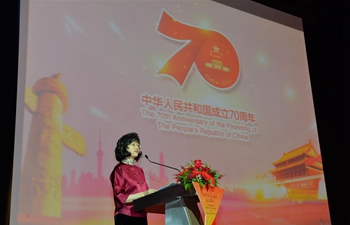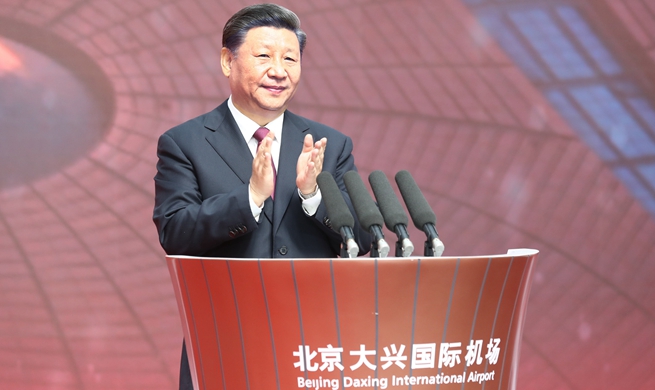ADDIS ABABA, Sept. 25 (Xinhua) -- China's successful rural development efforts could be seen as a true inspiration to Ethiopia's own rural and overall economic development aspirations, an Ethiopian official said on Wednesday.
"China's rural infrastructure development has focused on road, water and sanitation, electrification, and supply of solar energy products thereby helping Chinese farmers transition to industrialization," Jantirar Abay, Infrastructure and Urban Development Advisor to the Ethiopian Prime Minister Abiy Ahmed on a ministerial portfolio, said in an exclusive interview with Xinhua on Wednesday.
Abay, who also previously served as Ethiopia's Minister of Urban Development and Construction, stressed that China's rural development initiative, in which the funds allocated by the central government mainly distributed based on the needs and poverty levels of each county, could be one area of engagement to replicate in Ethiopia and beyond the African continent.
Recalling his recent 20-day field visit and a workshop held in China's Inner Mongolia Autonomous Province earlier this month, Abay also noted that his latest experience in China has helped him to witness firsthand the success of China's rural transformation and industrialization efforts.
Abay, who had also previously attended 13 lecture workshops in Beijing, facilitated and led by prominent Chinese lecturers across various development areas, said that such engagements have helped him to grasp an actual understanding of China's successes in transforming the rural sector.
"The training was interesting and we got many lessons there," Abay said, adding "The training focused on how much China is eradicating poverty and transforming the country as a whole. We have got really good lessons and experience regarding China."
Abay also emphasized his personal observation on how the Chinese central government plans development projects that can be implemented down to ground level, eventually helping China achieve remarkable poverty reduction successes over the last four decades, which he dubbed as a major lesson for the East African country's own development ambition.
"Ethiopia is trying to reduce poverty, but the speed is quite different. China is accelerating in its poverty reduction efforts whereas in Ethiopia we're creeping to reduce poverty," he said.
The Ethiopian minister also commended China's green development strategy, which the East African country is also pursuing to regenerate previously depleted landscapes.
In May, Ethiopia launched a campaign to plant 4 billion trees nationwide, which envisages to bring an end to rising deforestation, which the Ethiopian government frequently labeled as "a daunting challenge" to the country's green economy strategy.
According to Abay, much of China's topography, especially the western and northern part of the country, is hilly and mountainous, not particularly suitable to human habitation and previously not covered by forests.
According to Abay, China has been able to successfully undertake afforestation programs by giving households solar energy supplies so that they will be able to use the technologies instead of firewood.
"China's afforestation program is also a source of means of food for people involved in it," said Abay. "In Ethiopia, we simply count the coverage of forests area, but in China they consider the apple, banana and orange trees as forest, while it also doubles as a means of food security. This contributes to food security, land rehabilitation and green economy strategy as a whole."
Abay, noting China as a home to around 1.4 billion people making it one-fourth of the globe's population, stressed that "China's success in food security, employment, and green economic development strategy is truly remarkable."
"In Beijing, for instance, there are around 23 million people living in the city, but you never find a person out of work when you go around the city," he stressed.
"This is because the Chinese government is committed to job creation and making sure its citizens engage in work. This is a lesson that has to be taken by the Ethiopian government," he added.
Noting Ethiopia's relative success in the last 27 years in reducing poverty, Abay also emphasized that his country "should learn the value of discipline and commitment from Chinese experience if it's to accelerate its national poverty reduction program."
"During the last 27 years, lots of things have been done to reduce poverty, but the poverty level is still high," Abay argued, adding that "Ethiopia can accelerate its poverty reduction efforts if there is stronger government and party commitment as well as stronger societal and even family commitment."
Abay noted that 60-70 percent of Ethiopia's present population is the youth that can engage in work.
He further stressed the need to encourage the country's youth population to engage in different activities, while "a failure to do so, would bring political and even national crises."













